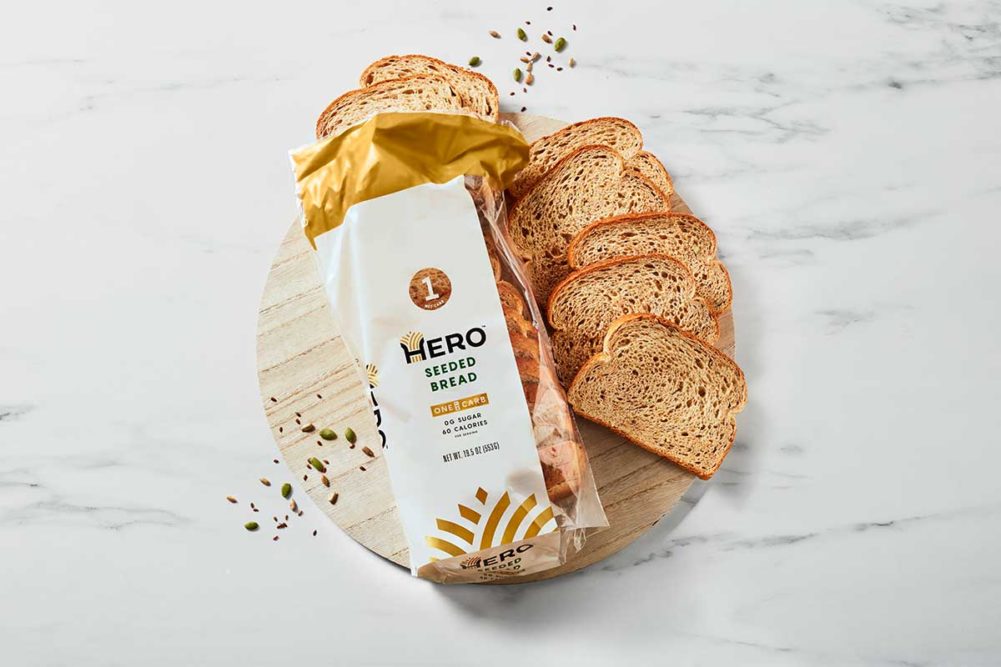Health claims are driving plenty of interest among consumers, and producers are rolling out a variety of options that capitalize on an expanding number of BFY attributes.
“Better-for-you claims are where the growth is coming from within bread and rolls,” said Melissa Altobelli, principle, client insights, dairy and bakery vertical, Circana. “A recent survey found 40% of primary shoppers do plan to eat healthier.”
Circana data shows non-GMO, no preservatives, organic and lower-calorie claims led dollar sales for the bread category. Protein and low-carb claims drove the most unit growth and will likely stay in high demand as diets like keto remain popular among consumers.
Hero Bread, San Francisco, for example, has grown rapidly thanks in part to its low-carb white sandwich bread, which offers between zero and 1 gram of carbs, less than 100 calories and no sugar while packing 5 to 10 grams of protein per serving. Hero Bread is the No. 1 white sandwich bread and hamburger bun on Amazon, and its parent company, Hero Labs Inc., raised $47.5 million in funding this year following an exclusive partnership with Subway.
Ben Sussna, vice president of marketing for Hero Bread, says the brand can grow by expanding its appeal beyond carb cutters, those who have eliminated carbs and make up 10% of the US population, to include more carb reducers, who are trying to eat less carbs and account for 42% of consumers.
“If we can fundamentally change what consumers view as the nutritional profile of bread as something that is good for them, isn’t high in calories, isn’t high in carbs and isn’t high in sugar and offers protein and fiber as an added nutritional benefit, why would you not switch over to that if it offers the same taste and texture as the bread that you love,” he said.
Schmidt Baking, a division of Baltimore-based H&S Bakery, expanded its popular, keto-friendly Old Tyme 647 line as well to include potato bread and rye varieties.
“We decided to take the healthier route and specialize in that area where we have already seen proven success,” said Ryan Paterakis, director of national sales, H&S Bakery, to Mr. Sosland on the company’s approach. “We are also doing research and development on a sub roll and kaiser roll for foodservice and/or in-store bakeries.”
The company has additionally done well with its Old Tyme Omega Me Crazy bread, Mr. Paterakis said, which meets consumer appetite for higher protein. The line recently expanded with an Awesome White variety, packing three times as much protein per serving as traditional white bread.
Plant-based options, including vegan options and those made from vegetables and pulses, are finding footing as well. Twenty-one percent of Generation Z consumers integrate plant-based foods and beverages into their meals compared to two years ago, according to Nielsen data from April 2023, and 54% of consumers view plant-based foods as “slightly or much healthier.”
Silver Hills Sprouted Bakery, Abbotsford, British Columbia, recently launched Omegamazing, a sliced sandwich bread made with sprouted whole wheat, ground chia seeds and ground flax seed. The bread is vegan, kosher and non-GMO verified, and each slice contains 5 grams of protein and 4 grams of fiber.
“Our customers are looking for better-for-you bread options that are nutrient rich but don’t sacrifice on flavor, and we’re thrilled to introduce our new Omegamazing offering, which does just that,” said Jodie Douglas, senior marketing director at Silver Hills Sprouted Bakery.
In an effort to boost its plant-based profile, Bimbo Bakeries USA’s Sara Lee brand added White Bread Made with Veggies to its portfolio. Fortified with vitamins A, D and E, the bread features approximately one cup of vegetables per loaf.
“We know that mealtime can be a battle with picky eaters and little ones that aren’t exactly in love with vegetables,” said Jinder Bhogal, senior brand manager at Sara Lee Bread. “We baked up the idea for our new Sara Lee White Bread Made with Veggies with families in mind to offer a deliciously unique option that’s new to the bread aisle.”
Brie Buenning, director of marketing for Los Angeles-based La Brea Bakery, added that breads incorporating multiple grains, seeds and regenerative wheat are becoming more popular as well.
Cincinnati-based Kroger Co., for example, partnered with Upcycled Foods Inc., Berkeley, Calif., to launch two breads under the grocer’s private label brand Simple Truth. The varieties, Upcycled Multigrain Quinoa and Upcycled Seeded Multigrain, contain 10% of Upcycled Foods’ ReGrained SuperGrain+, made from grains left over from the brewing process.
“Upcycled ingredient innovation is one of the most actionable solutions for food brands to be more sustainable,” said Dan Kurzrock, founder and chief executive officer of Upcycled Foods.
Fifty-two percent of consumers today are more aware of the environmental impact of their food choices and prefer products supporting a sustainable food system, according to 2022 data from the International Food Safety Council. Data from Puratos’ “Taste Tomorrow” research platform supports this, indicating that one in three shoppers are specifically interested in purchasing baked goods made with upcycled ingredients.
“Bring transparency to supply chains to connect with consumers,” Mintel stated in its bread trends report. “Brands can help consumers feel confident and empowered in their sustainable choices through transparent messaging.”
This article is an excerpt from the July 2023 issue of Baking & Snack. To read the entire feature on Pan Bread, click here.





